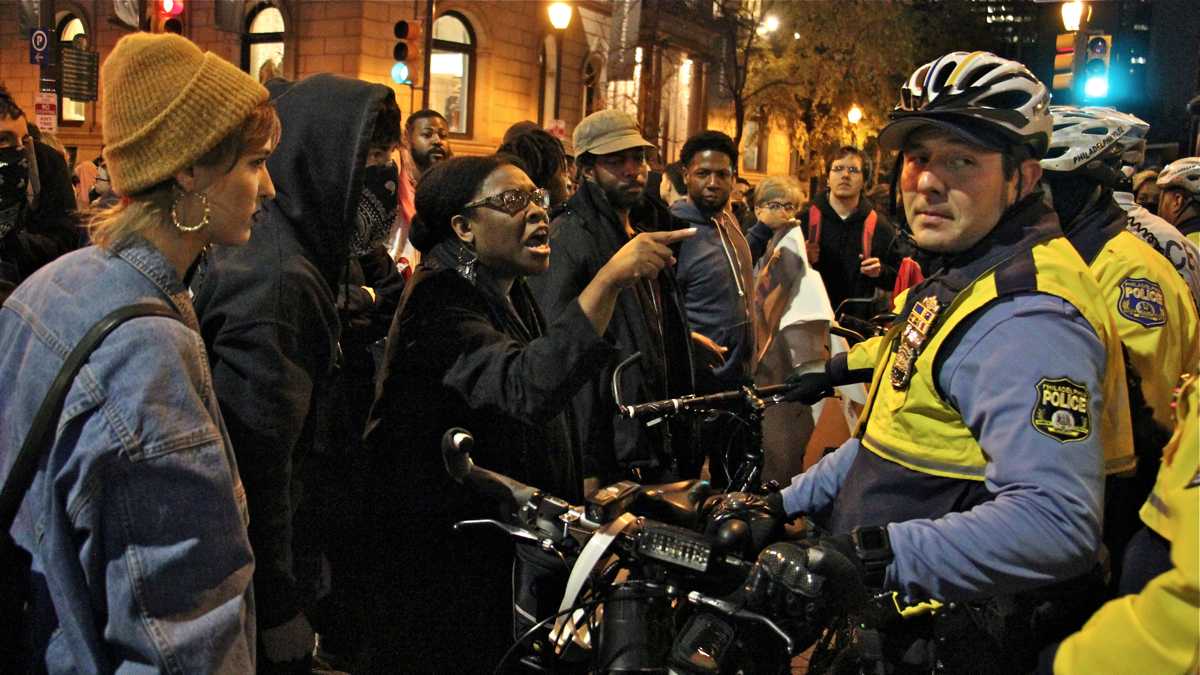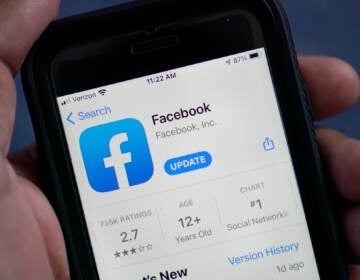Making real the racial faith, justice, and hope we talk about
A nightmare showed up to remind me that this is our time for struggle, and my voice is priceless. And silence won't make my dream come true. It has always been now.

Police and protesters clash at Rittenhouse Square after a winding march through Center City in November 2016. (Emma Lee/WHYY, file)
Join WHYY on Monday, May 22, for Courageous Conversations: Race at the Crossroads, a public discussion where we ask “What do we lose when we don’t talk about race, and how could our lives improve if we did?” This event is presented in partnership with WURD, Philadelphia Media Network, and American Bible Society.
—
I know we have been stressed and traumatized recently, and my deepest prayer is that you are taking care of yourselves and your families and loved ones. As I reflect on my own shock at the negative racial direction we are going in this country, I begin to feel energized around a singular question:
“Given the dark days and bright stars in our country’s history, in the resilient legacy of our communities of color, and in our centuries-long struggle for human rights against the terrorism of colonialism, has there been a better time? Has there ever been a ‘better’ or more necessary or tumultuous and poignant time to be engaged in the work of racial and cultural and difference empowerment that we have committed ourselves to, than now?”
I think not.
Why the hesitation to speak our truth about racial injustice? What are we afraid of? Being too harsh? That we might alienate allies? That people wouldn’t like us? That we would lose our jobs? That we would dash the power of post-racial hope? That someone would call us racist or a sell-out?
I hesitated because I did not want a life of hatred for my sons, and at times I swallowed or sold my voice for that dream. But a nightmare showed up to remind me that this is our time for struggle, and my voice is priceless. And silence won’t make my dream come true. It has always been now. This is our moment.
What if we taught our children how to speak to this climate of fear without internalizing that the hate is about their difference? Our children need us to teach them to combat rather than avoid this atmosphere of racial terrorism. They need a racial literacy. Not just having race talk, but healthy racial coping. For this time.
We were afraid to speak up because someone could get hurt, or we could lose our place, our power — what little we have. The trouble is that, when we lose our voice, when we swallow it or sell it for a fake peace, we lose our birthright.
Really? Really. C’mon, man. Being afraid of your own voice? Really?
And what about all those tears? Given the government-sanctioned shootings of black and brown people, those tears could fill a bucket, a landfill, a reservoir. Not guilty again? The time is now to turn those tears of mourning into refreshment for the journey we have always been on but forgot or stopped walking. We’ve allowed a nighttime for the weeping. Morning has arrived.
All those wishes for a better America should be work plans. All those delusions about “post-racial” should become “America’s Funniest Bloopers.” What if America is still as divided as it was in 1865? Would it matter who was president? Perhaps it would. Still, your pain is tied to my pain, whether or not you would like to segregate your children from mine. One truth that won’t go away is that while we all are paying the cost now for our silence and our fear, our low-resourced families pay more.
What are we waiting for? Clarity? Someone we love to die? Someone to distort my story? Someone to sacrifice themselves? Someone to fly? Are we waiting for a redemption song to brush off the fears, to recycle the tears, and to turn tragedy into cheers?
“None but ourselves can free our minds.”
We are the ones we are waiting for — to show up, speak up, stand up, love, do justice, and listen. Don’t just believe in social justice. Do it. As if my life depended on it. As if our children’s lives depended on it.
Has there been a better time when hatred was so stark, palpable, and political, where we had to put our voices, our healing, and justice to the test? I think not. We have to make real the promises and the speeches we have made. Why not verify whether our weapons of caring can conquer hostility? Is love transformative? Does racial empowerment lift us above the racial hate? Is listening going to open the door to love? Is my child as important as your child when he or she gets shot or goes missing? For what other calamity than this current one is faith meant to be transcendent?
Step up your game, folks. This silent, fence-sitting, keep-it-nice, waiting-for-a-colorblindness-sunset-we-can-walk-into coping strategy is dangerous to our brothers, our sisters, and our children, who have no fences and who cannot see the sun, let alone a sunset.
Mourn the loss of sunshine. Then face the darkness. This may be a dark time, but it is our time. It is our moment to become sunshine. Don’t sell your racial voice, your birthright, for anyone. Use it. Share it. Now.
—
Howard C. Stevenson, Ph.D., is the Constance E. Clayton Professor of Urban Education & Africana Studies at the University of Pennsylvania Graduate School of Education.
WHYY is your source for fact-based, in-depth journalism and information. As a nonprofit organization, we rely on financial support from readers like you. Please give today.




